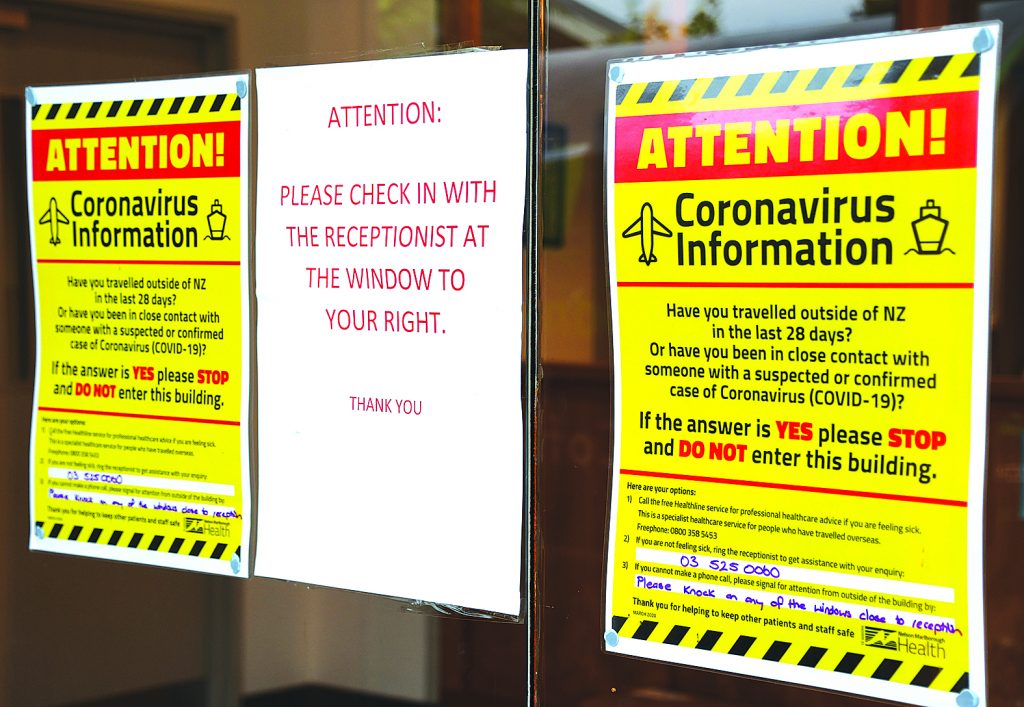
instructions for visitors. Photo: Jo Richards.
From global to local. Now the coronavirus COVID-19 has arrived in New Zealand, the task of controlling its spread, and treating those infected, falls to our leaders, our community and our local health service providers.
When the World Health Organisation declared pandemic on 11 March,director-general Dr Tedros Adhanom Ghebreyesus sent out a sobering message to the world: “We cannot say this loudly enough, or clearly enough, or often enough: all countries can still change the course of this pandemic. If countries detect, test, treat, isolate, trace, and mobilize their people in the response, those with a handful of cases can prevent those cases becoming clusters, and those clusters becoming community transmission.”
For Golden Bay, the key player in the fight against the virus is Nelson Marlborough Health, but while preparations are under way to cope with a possible outbreak, chief medical officer Dr Nick Baker says everyone has a responsibility to prevent the disease getting a foothold. “We need to stop it spreading and stamp it out.”
He says that most people are aware of the necessary personal hygiene measures, but stresses the need for added stringency. “All the basics, we should do better.”
Those basics include frequent hand-washing, covering coughs and sneezes and staying at home if unwell, but Dr Baker says it also involves a change of culture in how we physically interact in everyday social situations. “We have to be a low-touch society.”
In a community that is well known for its friendly greetings, substituting a close hug with an elbow touch, a foot tap or a simple nod will present a challenge. But it’s a vital weapon in the fight against the virus, says Dr Baker. “Be careful, be cautious. When shopping, for example, keep a metre away from people in the check-out queue.”
All these measures, he explains, are designed to disrupt the transmission of the virus which is the key to preventing a major outbreak. “We are learning that breaking the domino effect is critical.”
COVID-19 landed in the country via Auckland airport, and this remains one of the most significant entry points. The Government’s recent travel restrictions, including imposing 14 days’ self-isolation for all incoming travellers, including returning Kiwis, is something Dr Baker believes could affect a significant number in the Bay. “Golden Bay has a lot of people of European descent and there’s a lot of traffic.”
In the case of widespread infection, there is particular concern for vulnerable groups. “Those with a weakened immune system won’t fight it as well and it’s a risk for those with chronic lung disease and asthma,” says Dr Baker who has a tip for one particular group. “Now is a good time to stop smoking.”
Although stopping the spread of the disease is a top priority, Nelson Marlborough Health is planning for all scenarios explains Dr Baker. “We have ramped up preparation in hospitals. We’ll separate infectious and other patients by streaming them at the door.”
In severe cases patients may require specialist hospital treatment, but resources are limited, says Dr Baker. “Intensive care beds can be increased a bit, but not infinite.” This explains the importance of slowing the spread
of the virus by encouraging people to socially isolate and thereby flatten the peak demand for hospitalisation.
He understands that people will be worried but says they should phone the free coronavirus helpline (0800 358 5453) for advice before visiting Golden Bay Community Health, and explains that Golden Bay will move increasingly towards telehealth consultations. “We will be doing more and more by virtual health care so people don’t have to travel to Nelson. For a rural community like Golden Bay this is an important step. It will also help to protect patients and staff.”
Addressing concern about the availability of prescription medicines, Dr Baker says NMH’s logistics planning will ensure security of supply. “We’ve not got any major supply issues with drugs.”
While the northern hemisphere looks towards warmer weather – and a more hostile environment for the virus – New Zealand will be heading into traditional flu season. Dr Baker advises vulnerable groups to get their flu jabs when it becomes available next month. “The sooner the better.”
For more information, go to: www.health.govt.nz
